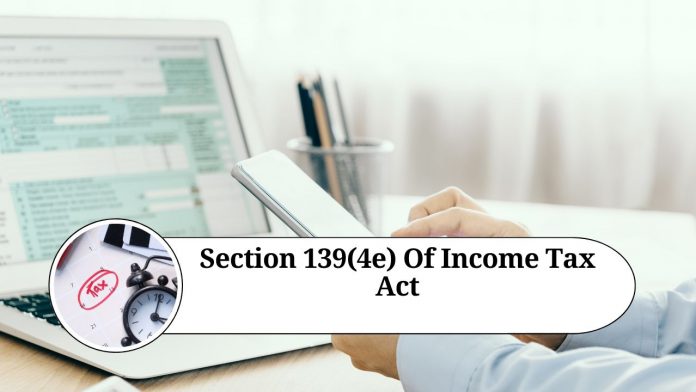The Income Tax Act of India is a crucial piece of legislation that lays down the framework for the collection and management of taxes. Section 139(4e) of the Income Tax Act is an important provision that deals with the filing of income tax returns by certain categories of individuals. In this article, we will delve into the details of Section 139(4e) and explain its implications for taxpayers.
What is Section 139(4e)?
Section 139(4e) of the Income Tax Act stipulates that a person who is required to furnish a return of income under Section 139(1) of the Act shall not be treated as having furnished the return unless he has obtained a unique identification number (UIN) under the Aadhaar (Targeted Delivery of Financial and Other Subsidies, Benefits and Services) Act, 2016.
Who is affected by Section 139(4e)?
Section 139(4e) applies to all individuals who are required to file an income tax return under Section 139(1) of the Income Tax Act. This includes individuals who have a total income of more than the basic exemption limit and individuals who are required to file a return due to any other provision of the Act.
Exceptions to Section 139(4e):
However, there are certain exceptions to this provision. For instance, individuals who are not eligible to obtain an Aadhaar number are exempted from the requirement to obtain a UIN. This includes individuals who are not residents of India or who are not citizens of India. In addition, individuals who are above the age of 80 years are also exempted from the requirement to obtain a UIN.
How to obtain a UIN?
To obtain a UIN, an individual must first obtain an Aadhaar number. An Aadhaar number is a unique identification number issued by the Unique Identification Authority of India (UIDAI). Once an individual has obtained an Aadhaar number, he can link it with his income tax return and obtain a UIN. The process of obtaining a UIN is simple and can be done online through the income tax department’s e-filing portal.
Implications of Section 139(4e):
Section 139(4e) has significant implications for taxpayers. It is important to note that failure to obtain a UIN can result in the return of income being treated as not filed. This can lead to penalties and legal action being taken against the taxpayer. Therefore, it is essential for taxpayers to ensure that they obtain a UIN before filing their income tax return.
In addition, obtaining a UIN can help taxpayers to streamline the process of filing their income tax return. The UIN serves as a unique identification number that can be used to track the status of the return and ensure that it has been filed correctly. This can help to avoid any errors or discrepancies in the return and can also help to expedite the process of processing the return and issuing any refunds that may be due.
Conclusion:
Section 139(4e) of the Income Tax Act is an important provision that requires individuals to obtain a unique identification number (UIN) under the Aadhaar Act in order to file their income tax return. While there are exceptions to this requirement, it is important for taxpayers to ensure that they obtain a UIN before filing their return to avoid penalties and legal action. Obtaining a UIN can also help to streamline the process of filing the return and ensure that it is processed correctly. Therefore, it is advisable for all taxpayers to obtain a UIN and comply with the provisions of Section 139(4e).
Read more useful content:
- section 234e of income tax act
- section 286 of income tax act
- section 90a of income tax act
- section 40a(7) of income tax act
- section 226(3) of income tax act
- section 24 of income tax act
Frequently Asked Questions:
Q: Who is required to obtain a unique identification number (UIN) under Section 139(4e)?
A: Individuals who are required to file an income tax return under Section 139(1) of the Income Tax Act are required to obtain a UIN. This includes individuals whose total income exceeds the basic exemption limit.
Q: How can I obtain a UIN?
A: To obtain a UIN, you must first obtain an Aadhaar number. Once you have an Aadhaar number, you can link it with your income tax return and obtain a UIN. The process of obtaining a UIN can be done online through the income tax department’s e-filing portal.
Q: Are there any exceptions to the requirement to obtain a UIN?
A: Yes, there are some exceptions to the requirement to obtain a UIN. For instance, individuals who are not eligible to obtain an Aadhaar number are exempted from the requirement to obtain a UIN. This includes non-residents and non-citizens of India. Individuals who are above the age of 80 years are also exempted from the requirement to obtain a UIN.
Q: What happens if I fail to obtain a UIN?
A: Failure to obtain a UIN can result in the return of income being treated as not filed. This can lead to penalties and legal action being taken against the taxpayer.
Q: Can I file my income tax return without a UIN?
A: No, you cannot file your income tax return without a UIN if you are required to obtain one under Section 139(4e) of the Income Tax Act. Your return will not be considered filed if you do not have a UIN.
Q: How can a UIN help me with my income tax return?
A: A UIN serves as a unique identification number that can help you track the status of your income tax return and ensure that it has been filed correctly. This can help to avoid any errors or discrepancies in the return and can also help to expedite the process of processing the return and issuing any refunds that may be due.




















